Definition: The foreign exchange market or the ‘forex market’, is a system which establishes an international network allowing the buyers and sellers to carry out trade or exchange of currencies of different countries. A forex market can be stated as one of the most liquid financial markets which facilitate ‘over-the-counter’ exchange of currencies.
In New York, advanced telecommunication technology called Society for Worldwide Interbank Financial Telecommunications (SWIFT) is used by the banks for carrying out foreign exchange transactions at the electronic clearinghouses like Clearing House Interbank Payment System (CHIPS).
Content: Foreign Exchange Market
Participants in the Foreign Exchange Market
The participants here refers to the people involved in the exchange or trade of foreign currency. These can be the buyers, sellers or the intermediaries.
The participants in a forex market include the following five parties: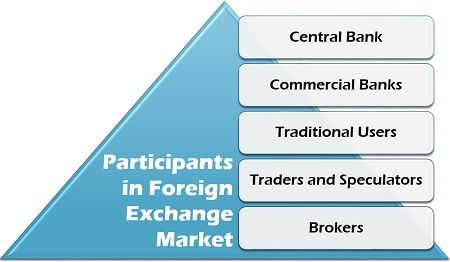
- Central Bank: The central bank regulates the exchange rates of the currency of their respective country to ensure fluctuations within the desired limit and keep control over the money supply in the market.
- Commercial Banks: The commercial banks are the medium of forex transactions, facilitating international trade and exchange to its customers along with other forex functions like making foreign investments.
- Traditional Users: The traditional users involve foreign tourists, companies carrying out business operations across the globe, patients taking treatment in other country’s hospitals and students studying abroad.
- Traders and Speculators: The traders and speculators are the opportunity seekers and look forward to making a profit through trading on short-term market trends.
- Brokers: They are considered to be financial experts who act as an intermediary between the dealers and the investors by providing the best quotations.
Characteristics of the Foreign Exchange Market
To understand what a forex market is, we must first go through its essential features.
Discussed below are the various characteristics of the foreign exchange market which differentiates it from other financial markets: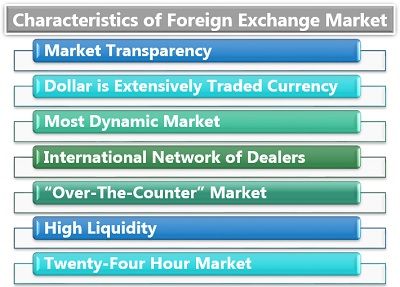
- Market Transparency: It is effortless to monitor the fluctuations in the value of currencies of different countries in a forex market easily through account tracking and real-time portfolio, without the involvement of brokers.
- Dollar is Extensively Traded Currency: The USD, which is paired with almost every country’s currency and listed on the forex, is the most widely traded currency in the world.
- Most Dynamic Market: The value of the currencies in the forex market keeps on changing every second and function twenty-four hours a day. This makes it one of the most active markets in the world.
- International Network of Dealers: The foreign exchange market establishes a medium among the dealers and also with the customers. There are dealer’s institutions located globally to carry out the exchange and trading activities.
- “Over-The-Counter” Market: In different countries, the forex market is the highly unregulated market initiating over the counter trade by the banks through telex and telephone.
- High Liquidity: The currency is considered to be the most widely traded financial instrument across the globe, making the forex market highly liquid.
- Twenty-Four Hour Market: The foreign exchange market is operational for twenty-four hours of the day, initiating the active trade and exchange of currencies at any time.
Transactions in Foreign Exchange Market
A forex market performs three significant operations which are explained in detail below: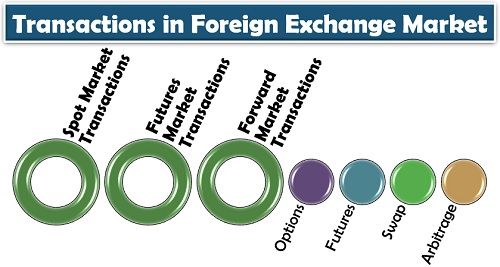
Spot Market Transactions
The forex transactions which are executed immediately, or usually within two days, is known as the spot transaction. Such a forex market is termed as a spot market, and the rate of exchange is called a spot rate.
Futures Market Transactions
The market in which the exchange of currencies involve a future delivery and payment and the rate of exchange for the same is pre-determined is called a futures forex market. Such exchange rate is known as a future rate. It protects the buyer from the risk of a rise in the value of the currency.
Forward Market Transactions
A forward forex market is however very similar to the futures market, but here, the terms of the contract are negotiable and can be amended by any of the parties involved.
- Options: In an options contract, the holder is not bound to but have the right to buy or sell the specified asset quantity at the pre-determined price on the specific future.
- Futures: In a future contract, the quantity of an asset, date of execution and price of the contract is fixed and standardized.
- Swap: Usually, commercial banks adopt swap contracts if they perform forward exchange business operations. Here, they sell off a particular currency in the spot market to buy that same currency in the forward market.
- Arbitrage: The rigorous buying and selling of different currencies in the forex market to fetch gains out of such transactions are called arbitrage.
Functions of Foreign Exchange Market
A foreign exchange market is the largest global financial market which performs some crucial functions. The three of the primary functions of a forex market are as follows: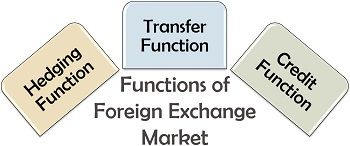
- Hedging Function: The globally trading business entities can hedge the risk of currency fluctuations by adopting means like a letter of credit or forward contract. Here, the goods are to be delivered on a pre-determined future date and at a mutually agreed price.
- Transfer Function: The forex market majorly functions to exchange the currency of one country into that of other, to facilitate international trade activities.
- Credit Function: Providing the credit facility at the time of making overseas payments through foreign bill of exchange to its maturity or execution, is another significant function of the forex market.
Advantages of Foreign Exchange Market
As we know that ‘trade makes everyone better-off’ and so goes for the exchange or trade of currencies.
Let us now discuss the various benefits of the foreign exchange market: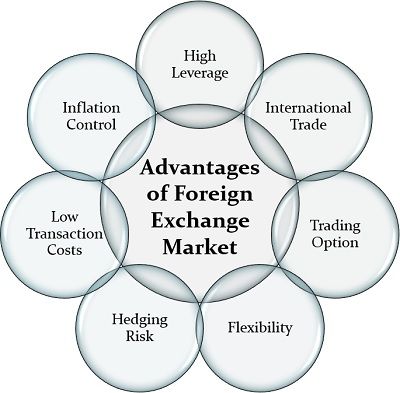
High Leverage: A forex investor can avail the facility of leverage or loan of up to 20 or 30 times of his/her capacity, for trading in the forex market.
International Trade: Every country has its currency and therefore, to facilitate trade activities between two countries, the forex market is essential.
Trading Option: For the speculators or traders, foreign exchange market is just like other financial markets where they can make money on short term fluctuations in the currencies.
Flexibility: We know that the forex market is a twenty-four-seven market, and there is no minimum or maximum limit of the exchange amount. It provides the flexibility of investment or exchange to the traders.
Hedging Risk: The forex market provides for hedging the risk of loss on currency fluctuations while carrying global business operations and trading in foreign currency.
Low Transaction Costs: Since brokers are not very much entertained in the forex market, the transaction cost (called as ‘spread’) charged by the dealers is reasonably low if compared to other financial markets.
Inflation Control: To maintain the economic stability in the country and control situations like inflation, the central bank maintains a forex reserve which consists of currencies of different countries around the world.
It adopts other means too, like decreasing bank lending rates and selling out domestic currency for foreign currency.
Disadvantages of Foreign Exchange Market
A forex market is not always favourable and involves various kinds of risks. These can be seen as its drawbacks and are elaborated below: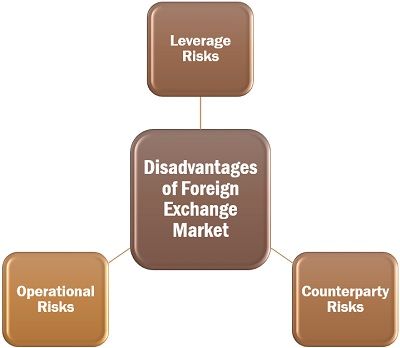
- Leverage Risks: Leverage refers to loan in other terms. Forex market initiates the leverage of up to 20 to 30 times the investment capacity of the traders or speculators, which may even lead the loss of the entire amount of the investor.
- Counterparty Risks: The forex is highly unregulated with no central authority for currency exchange or trading risk mitigation. Thus, it may encounter the risk of non-fulfilment of the obligations by any of the parties involved in such a contract.
- Operational Risks: Since forex is a twenty-four hours market, it is difficult to manage its operations by humans. As a result, the traders and MNCs rely on the algorithms, and trading desks spread, respectively, to safeguard their investment in their absence.
Note
The countries which actively participate in the forex trading includes US, UK, Australia, Germany, Switzerland, France, Italy, Japan, Indonesia, Cyprus, Malta, Bulgaria, Romania and many Central and Eastern Europe countries.
In countries like China, South Africa, Nigeria, Russia, Egypt and Ukraine, forex trading is allowed but under the restrictions of the central government.
However, in India, Bosnia Herzegovina, Israel, Belgium, Malaysia, North Korea, France and Pakistan, forex trading is strictly prohibited.
Sushil says
Notes are updated very beautifully.
Harsha Heji says
Thank u ☺️💓 .It helped a lot .I really hope it’s legit.
HANUMAPPA says
V good information .i really like this
Elaxi Flora says
The foreign exchange market is the backbone of forex currency It is exchanging one currency to another currency for various reasons.